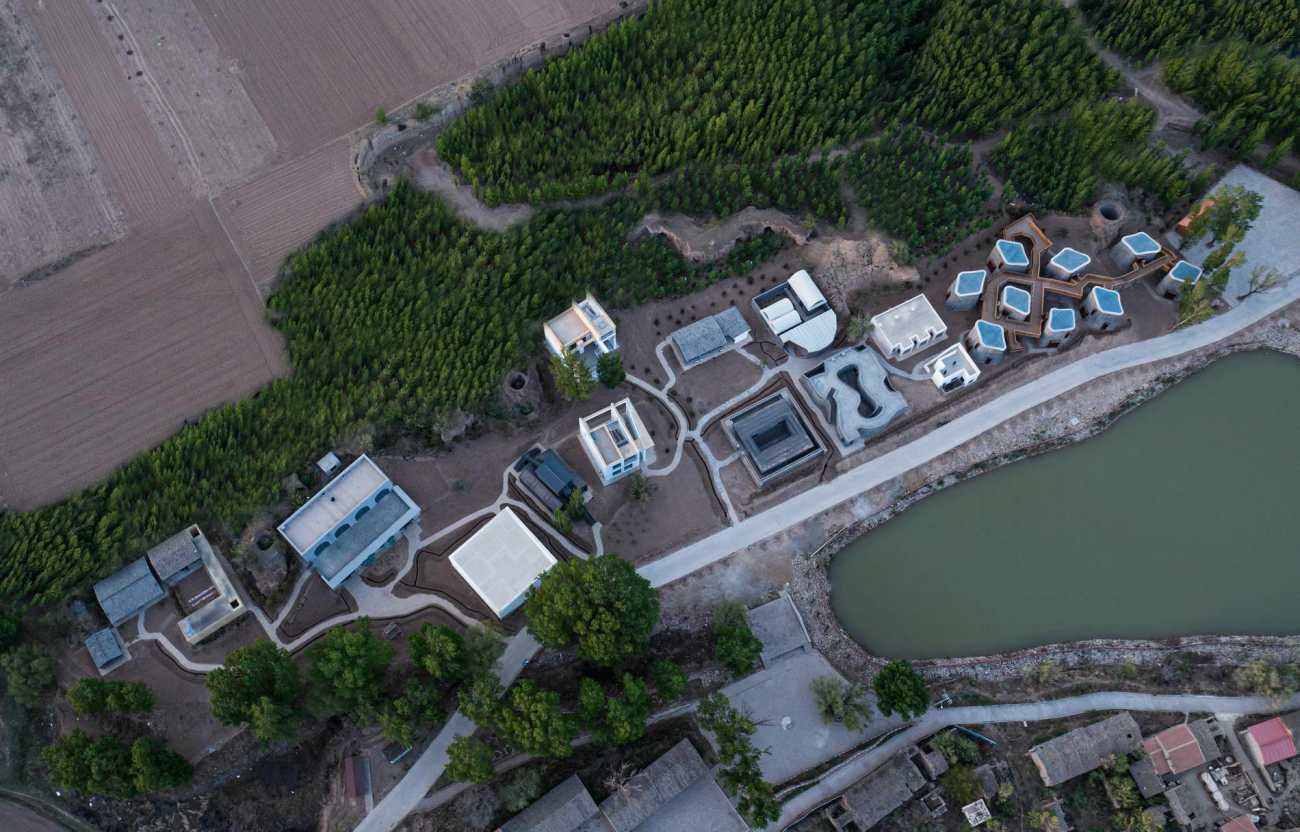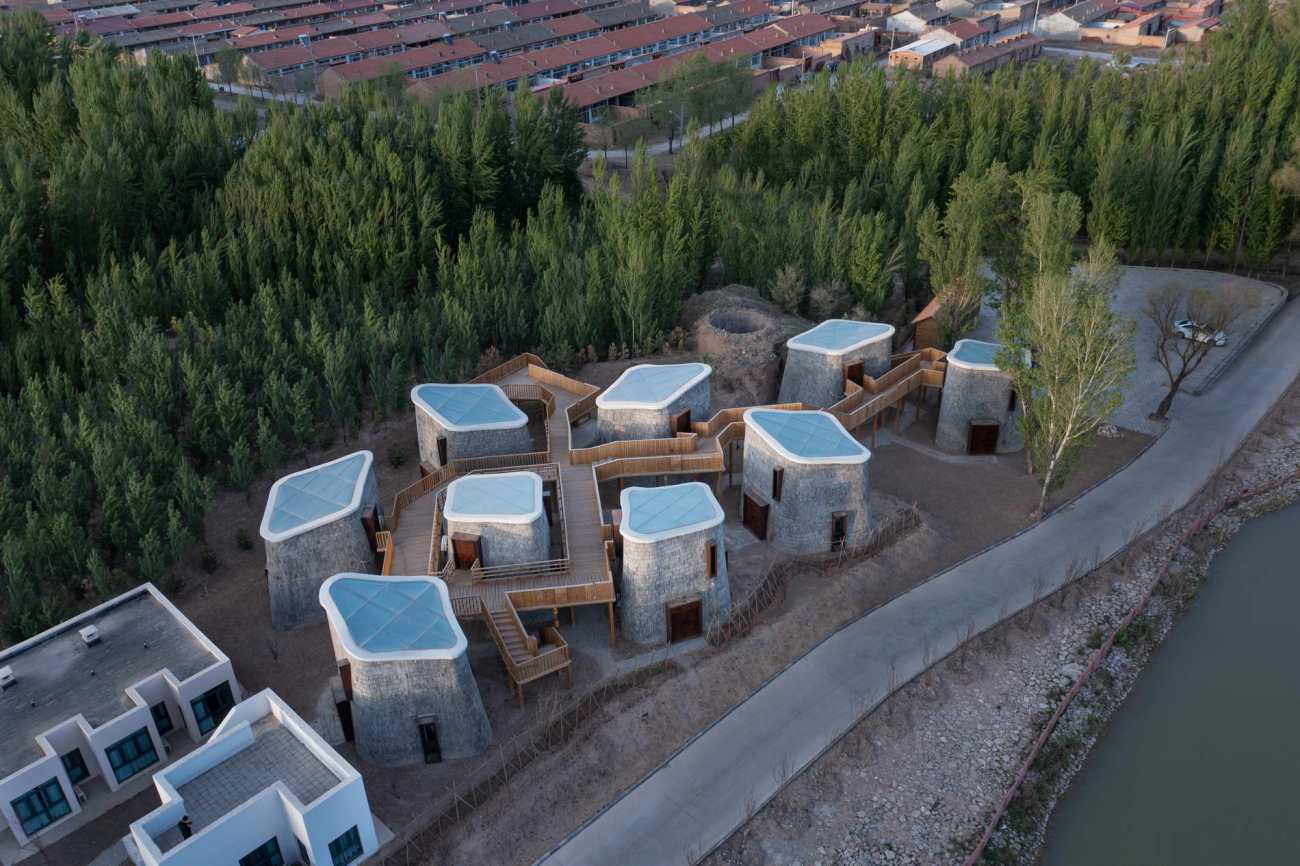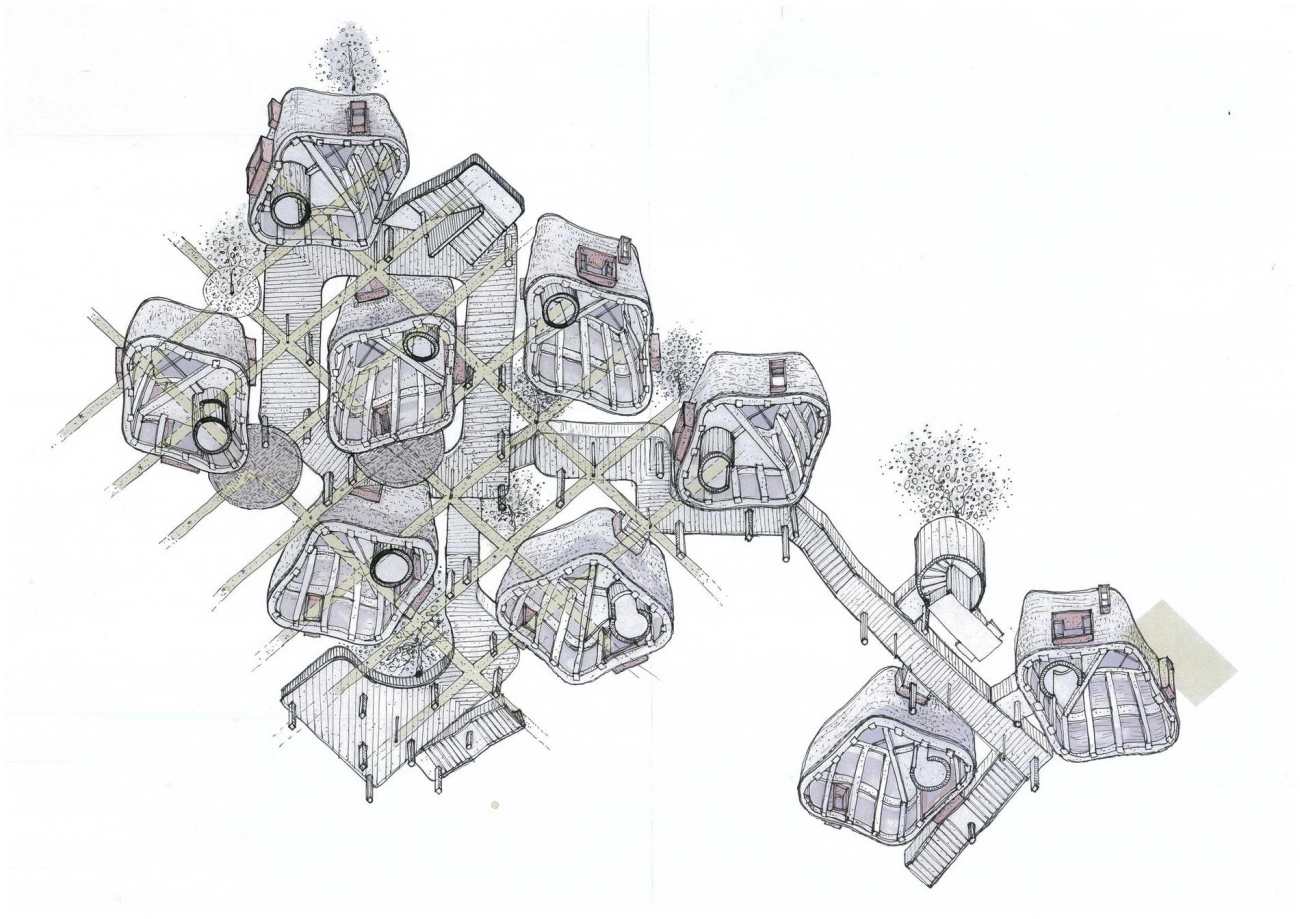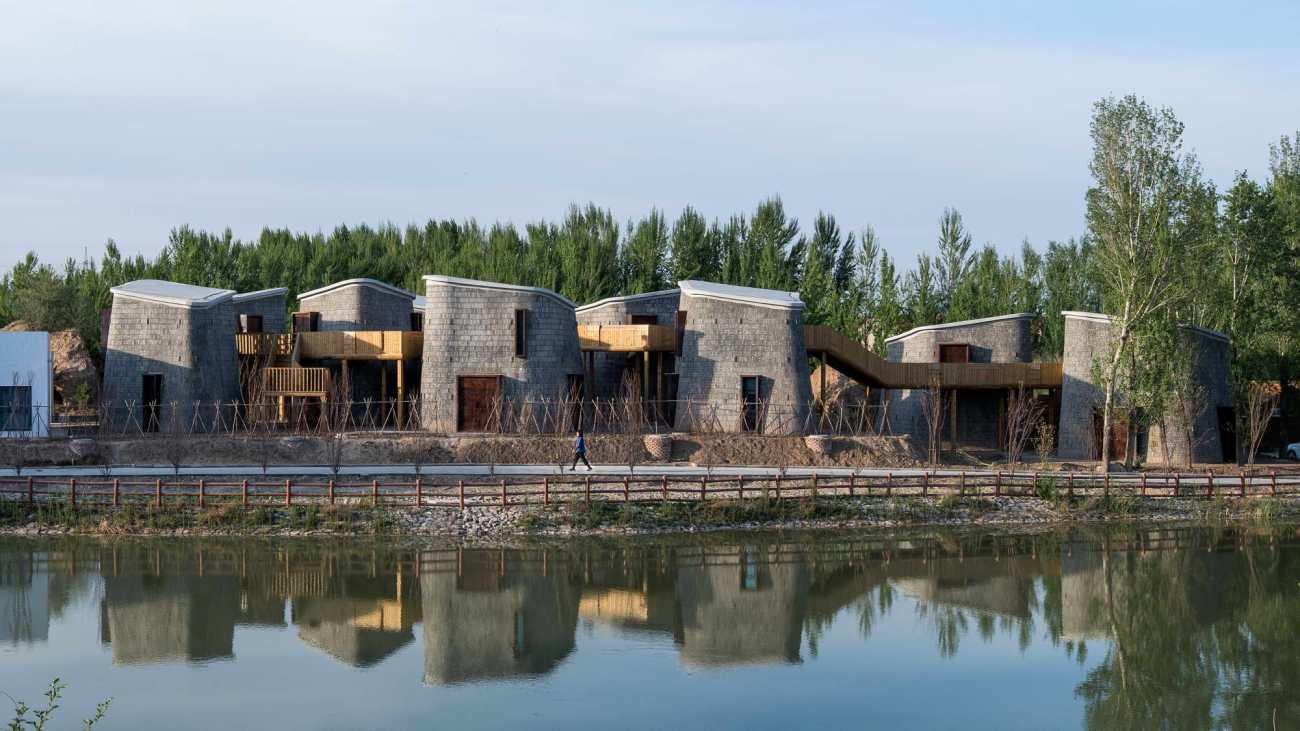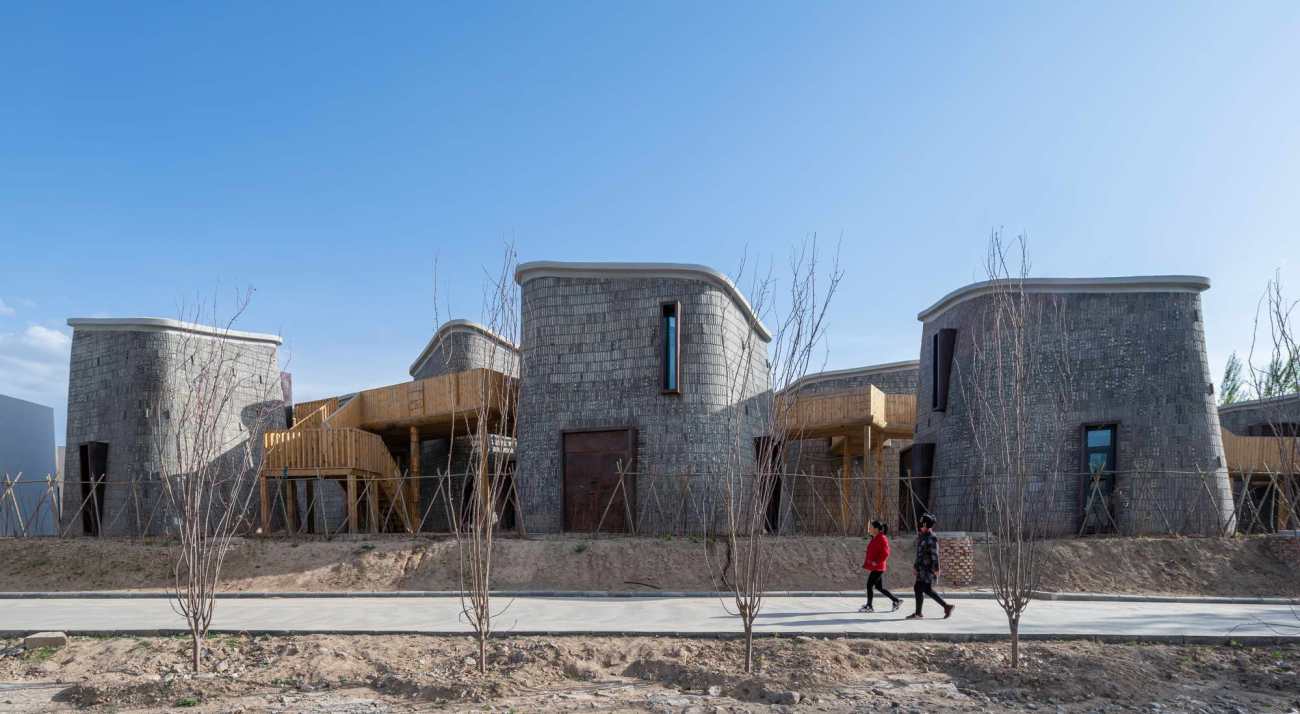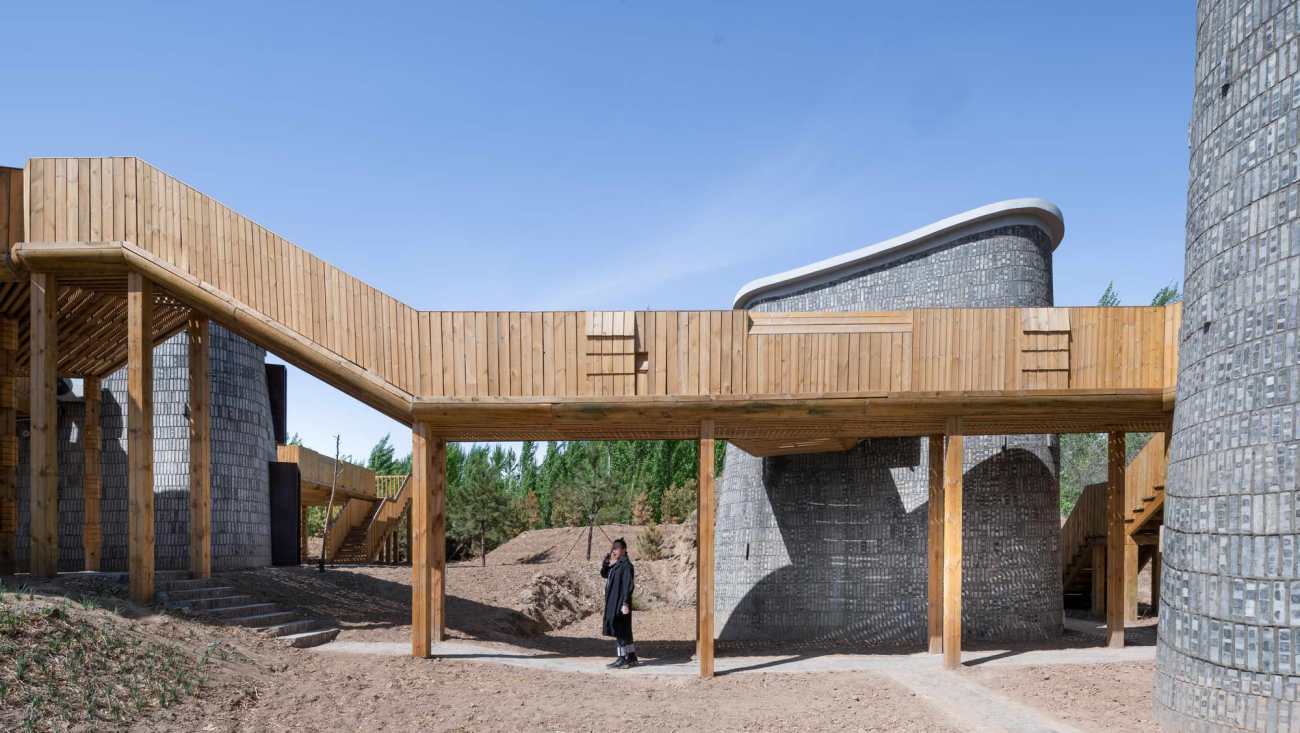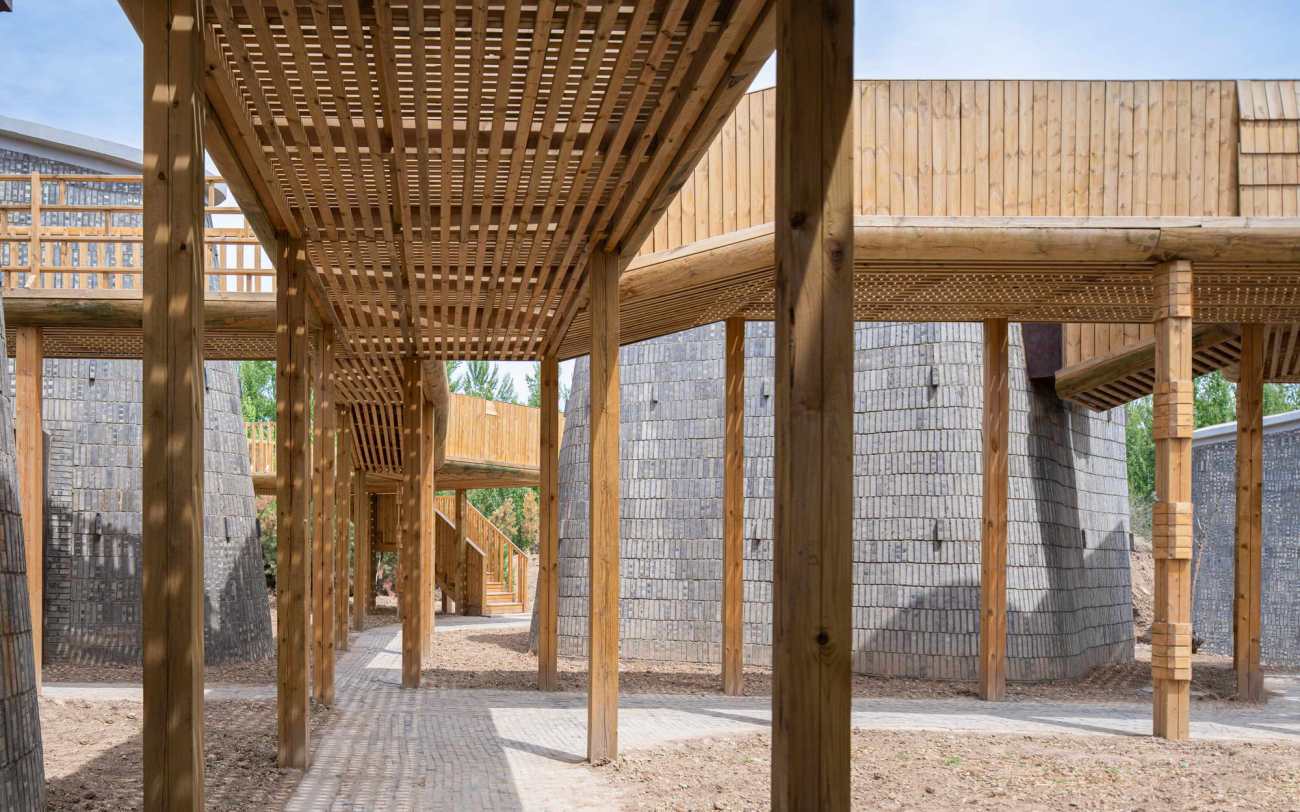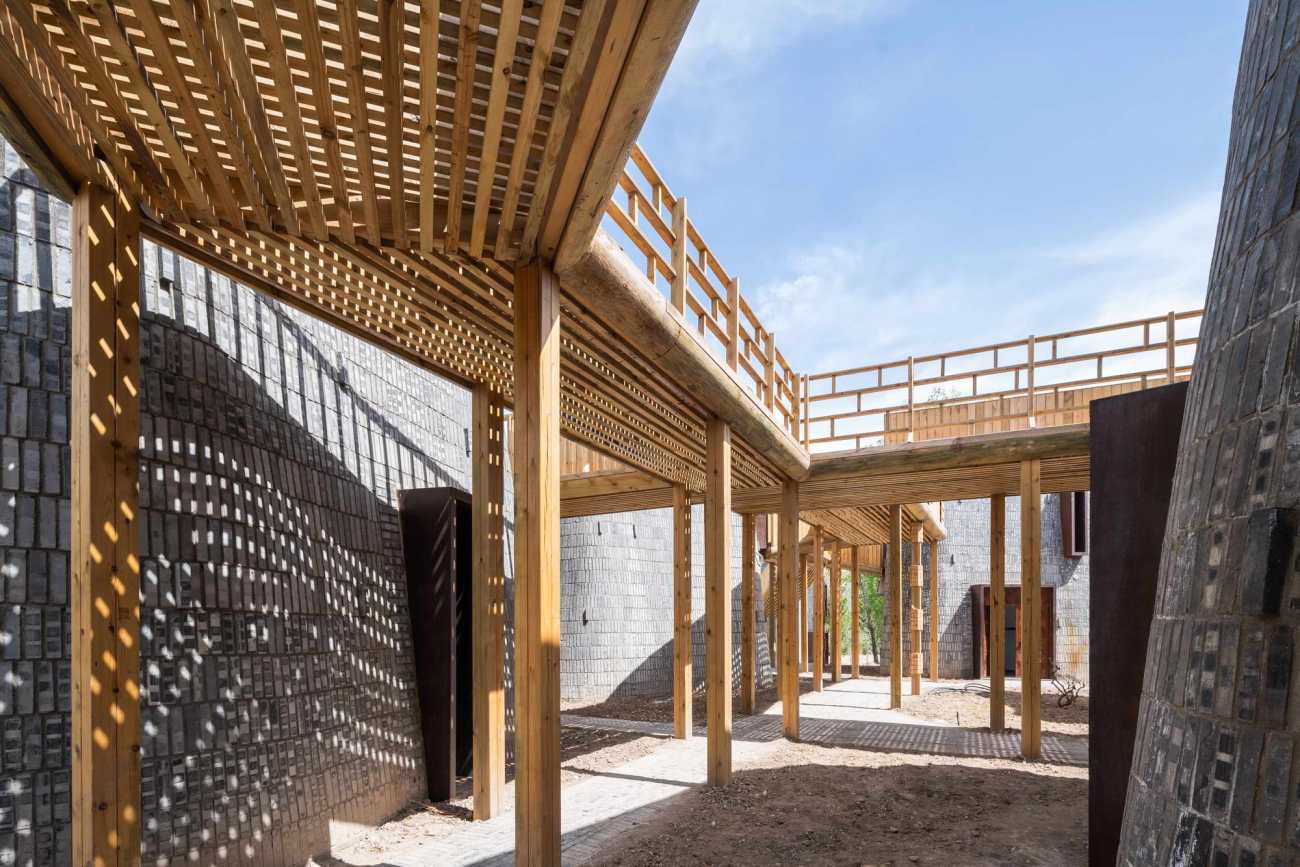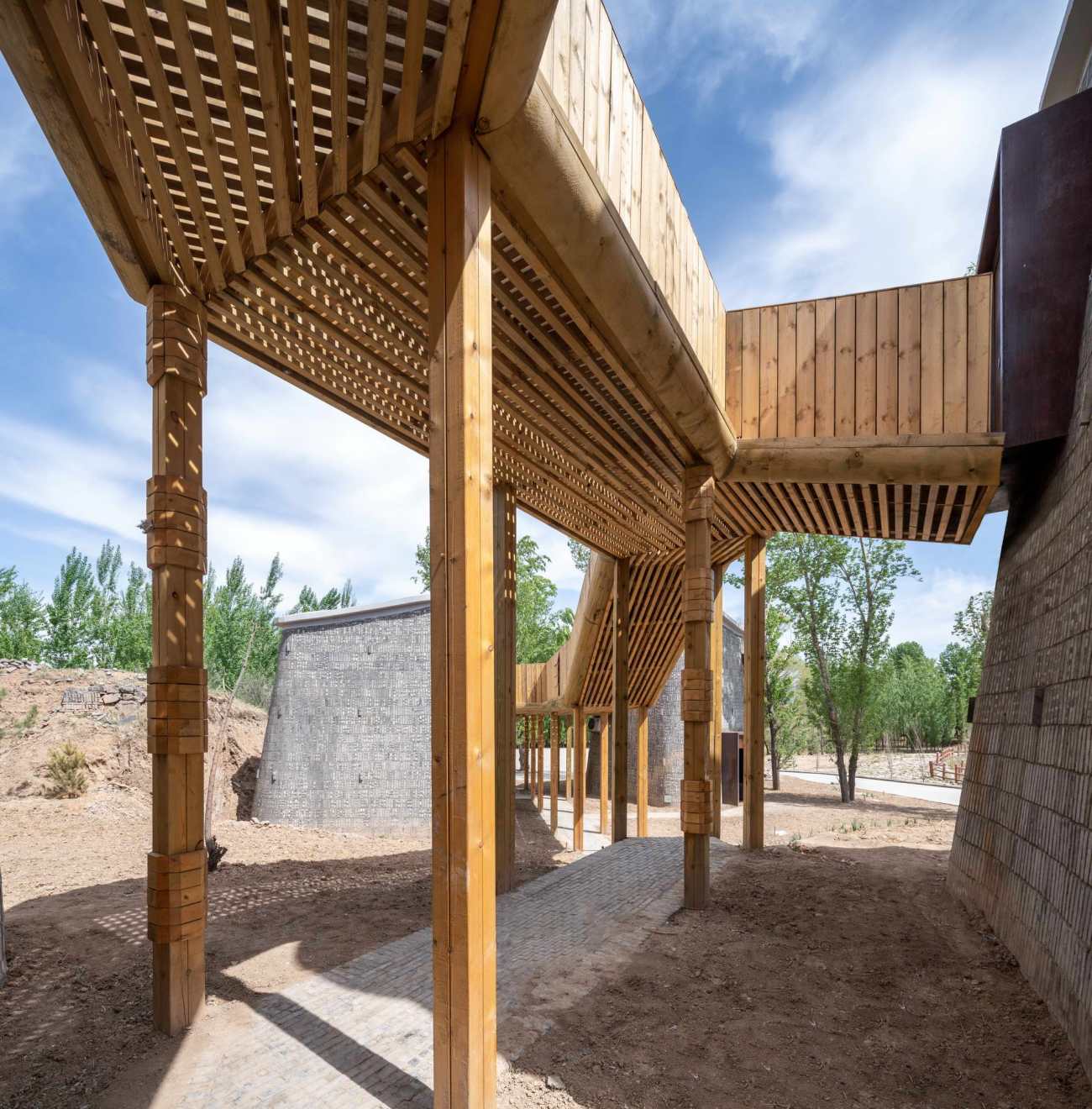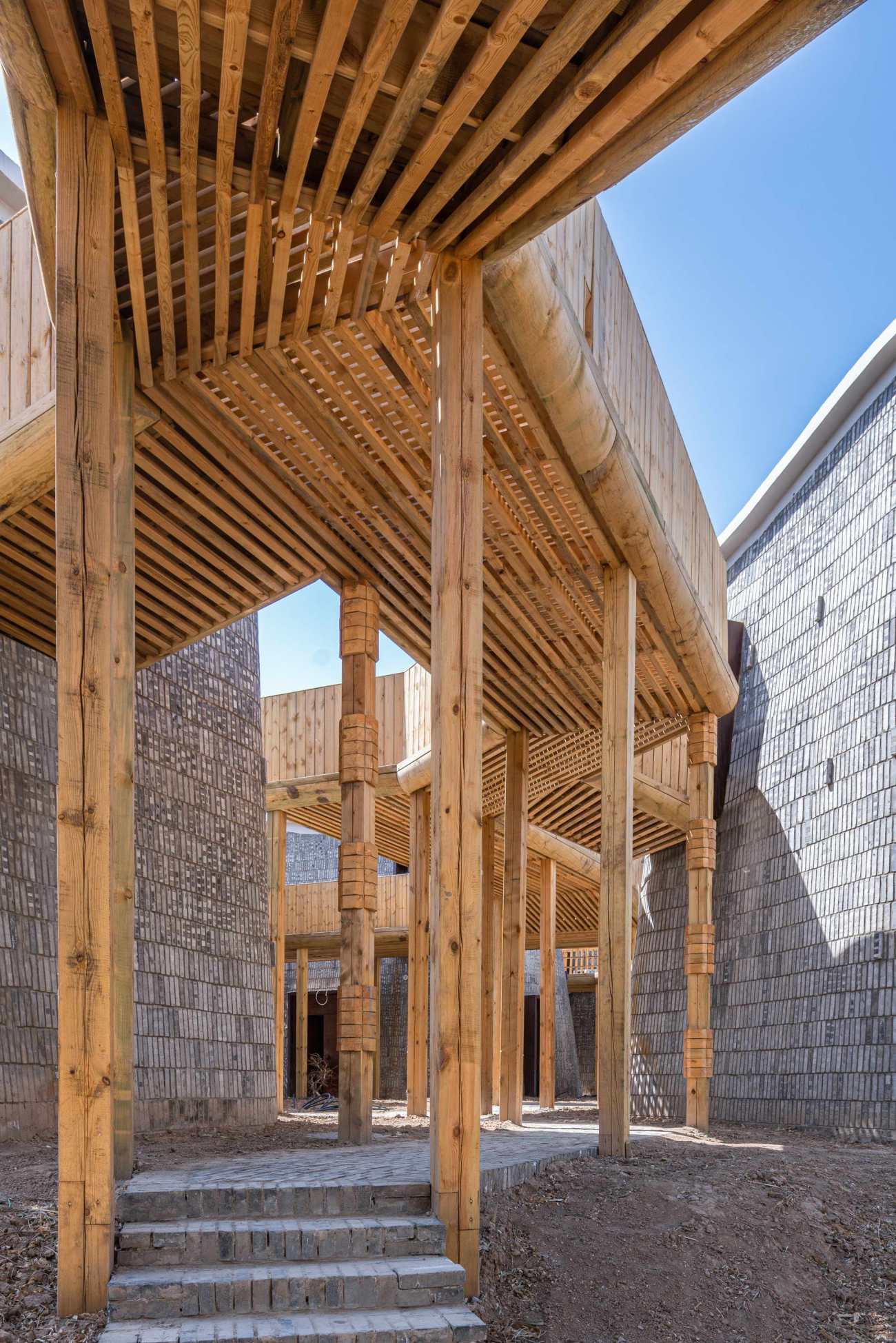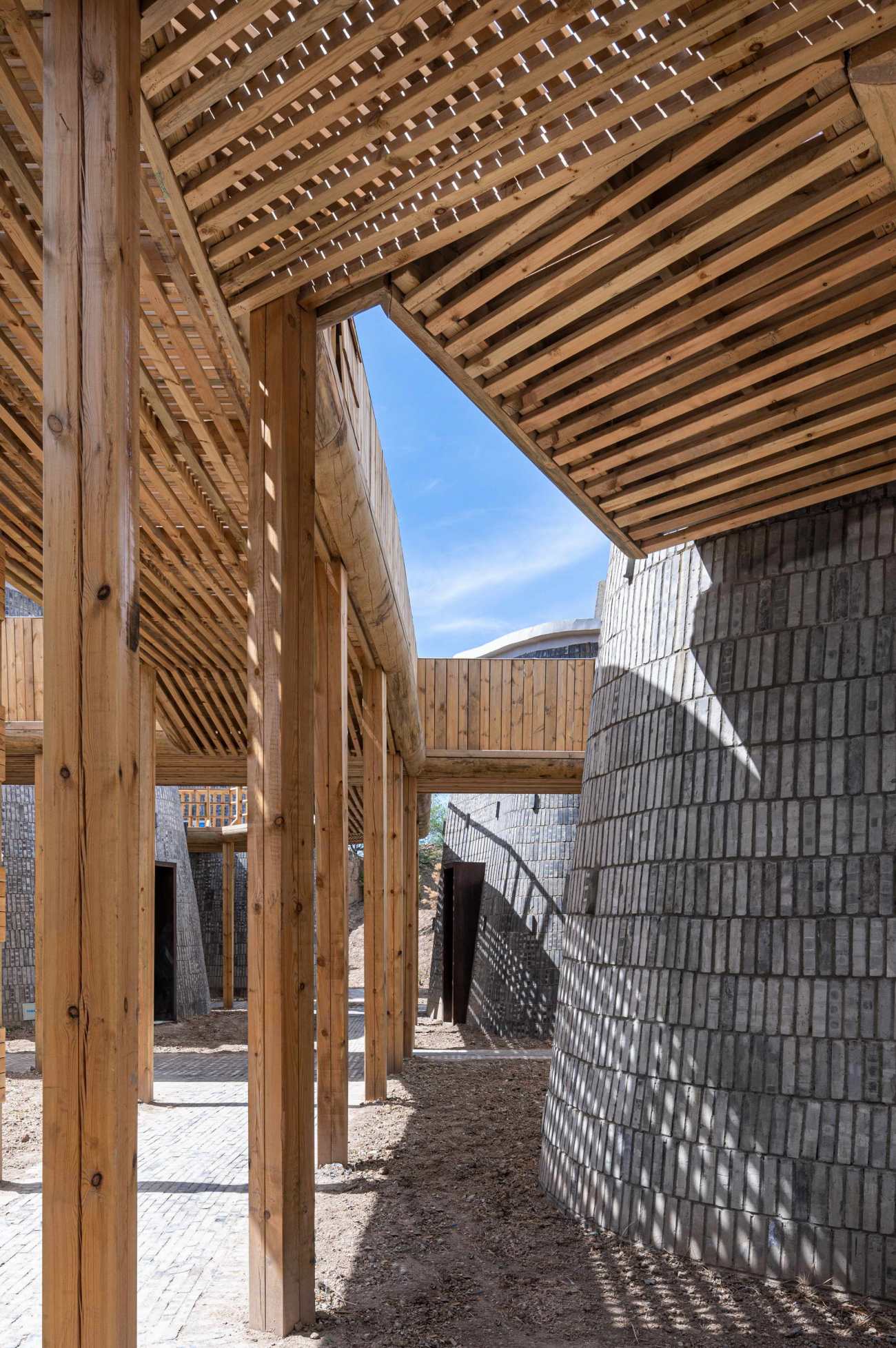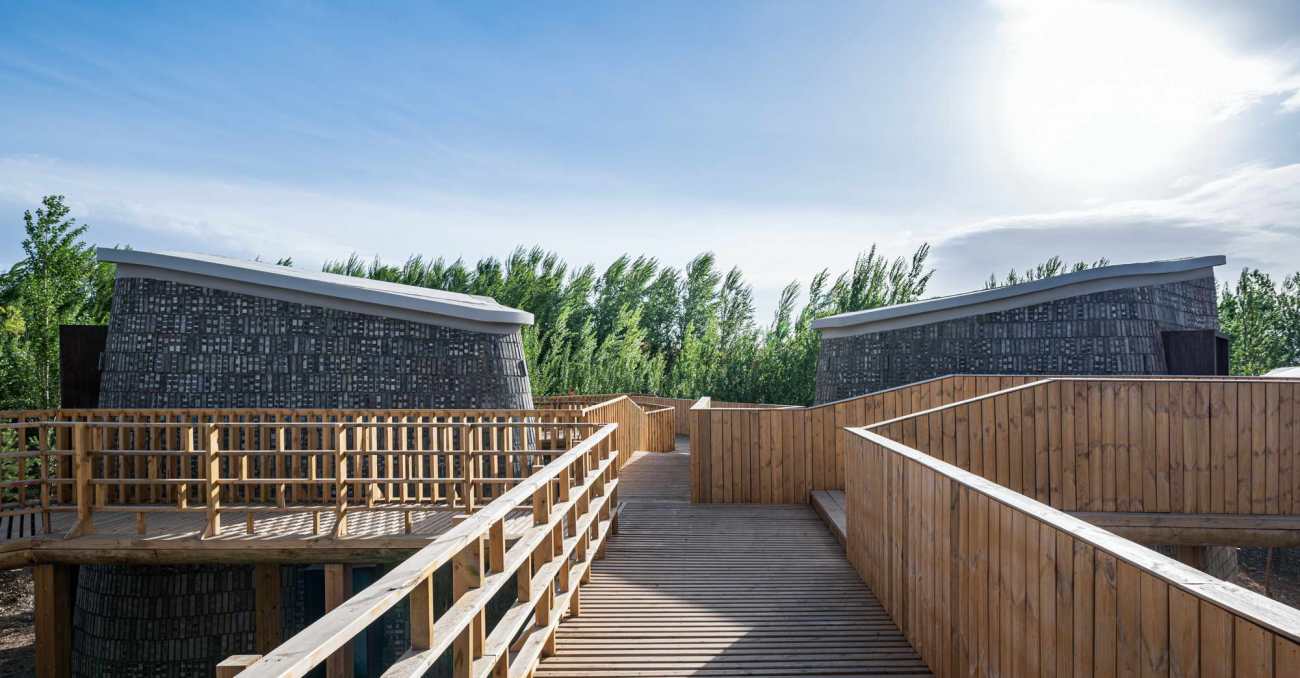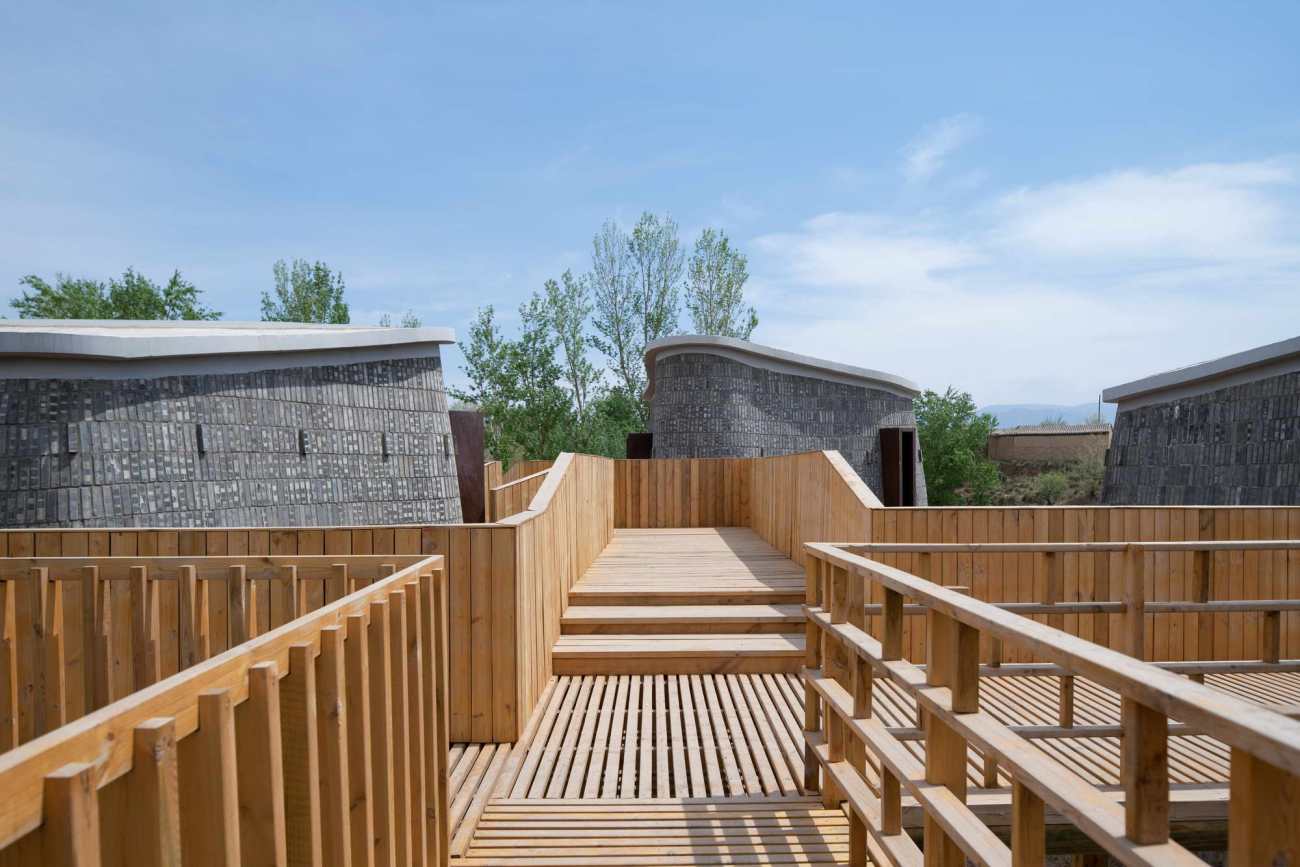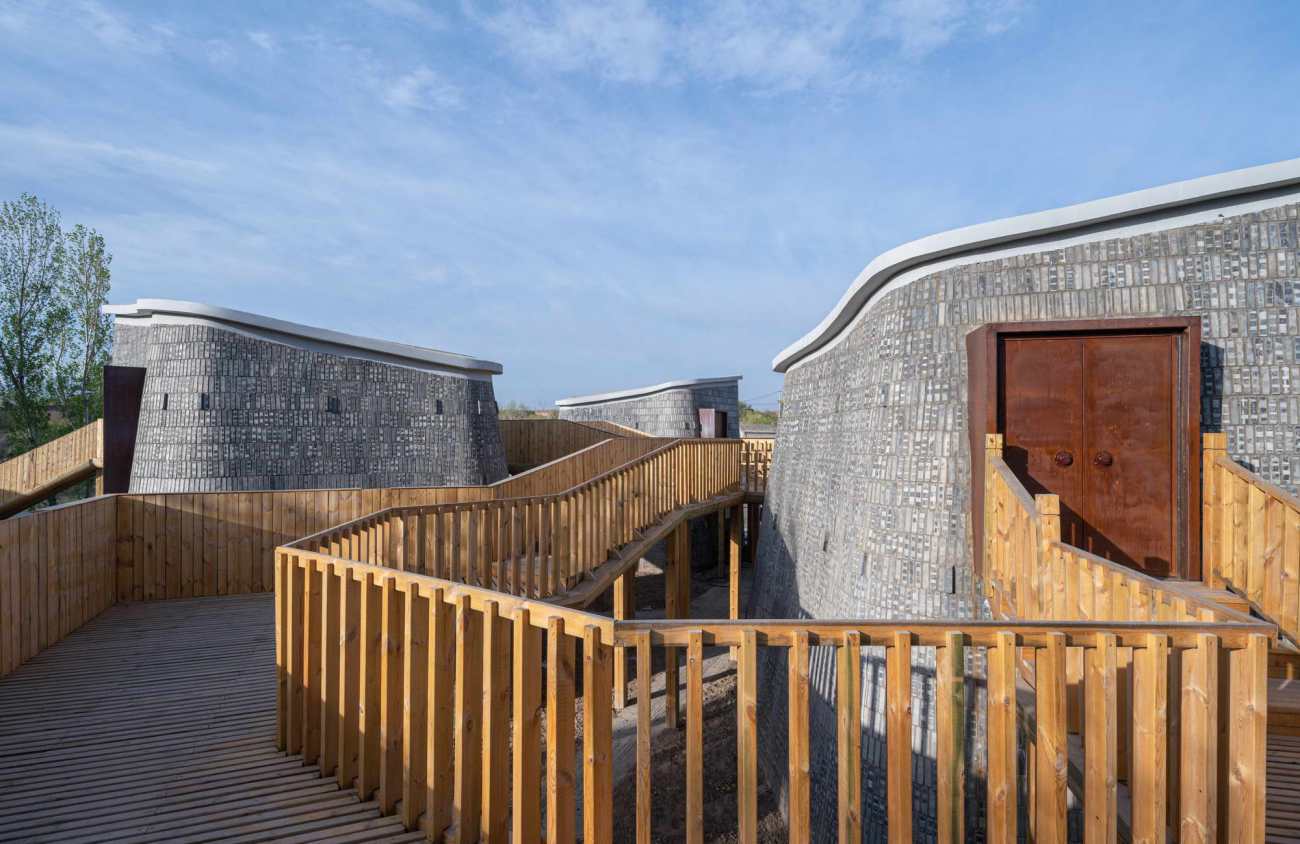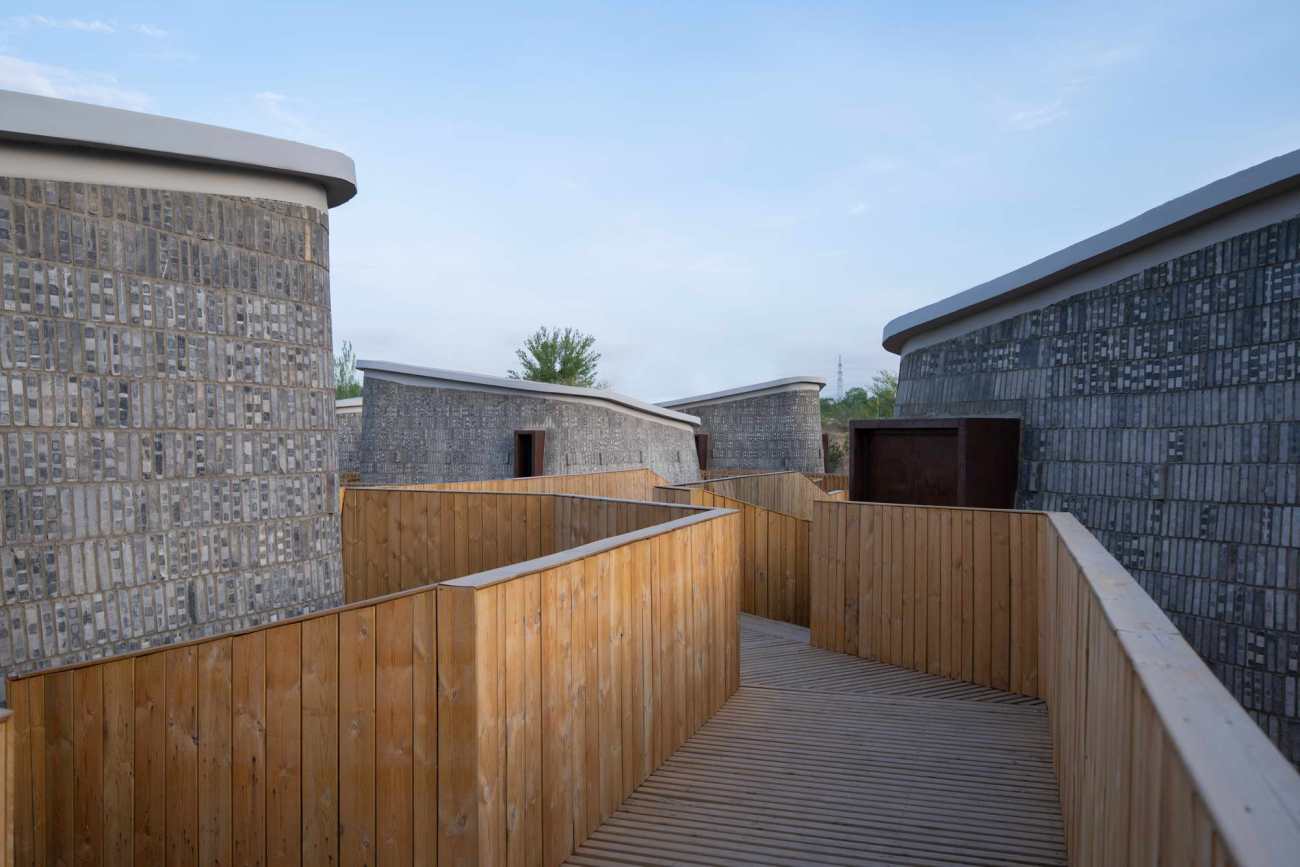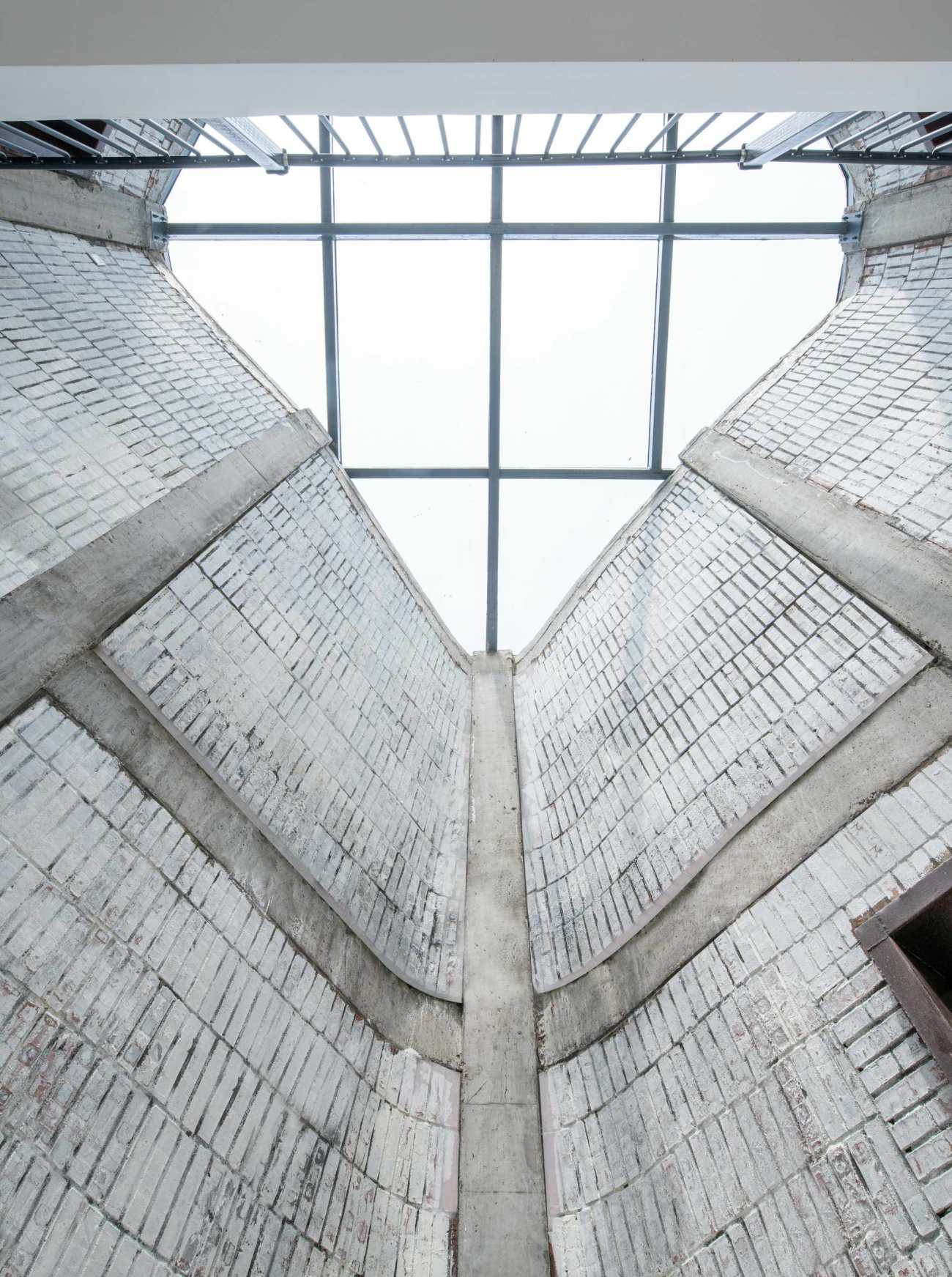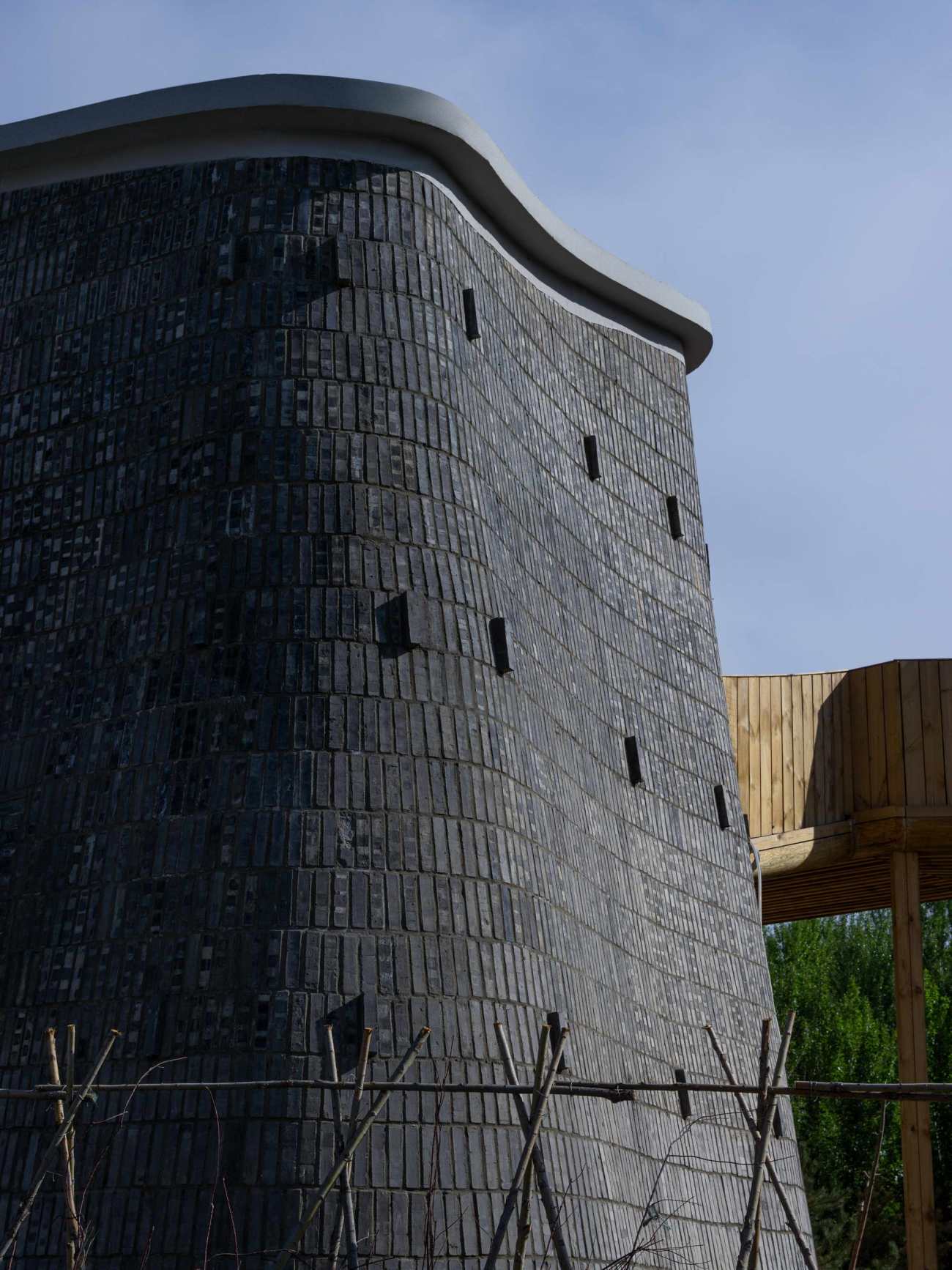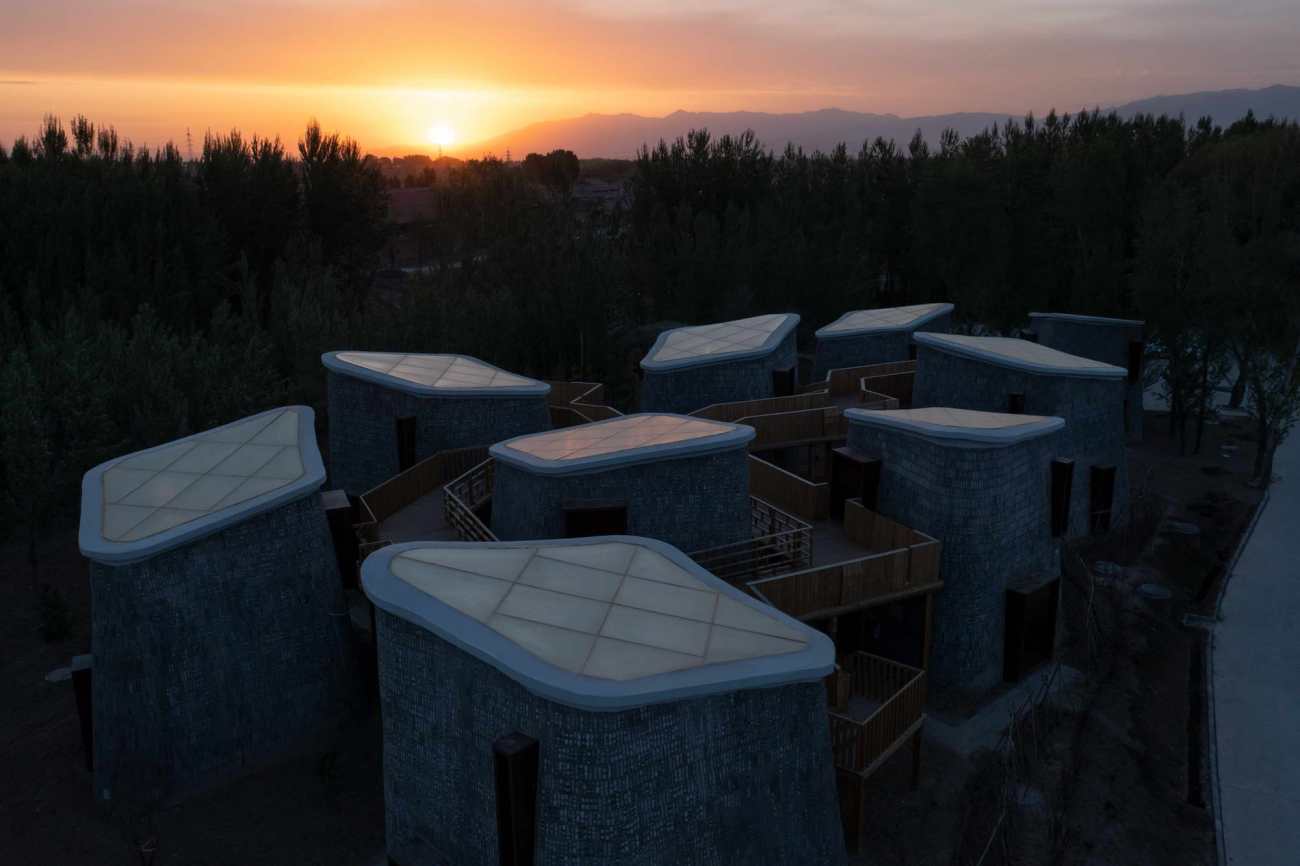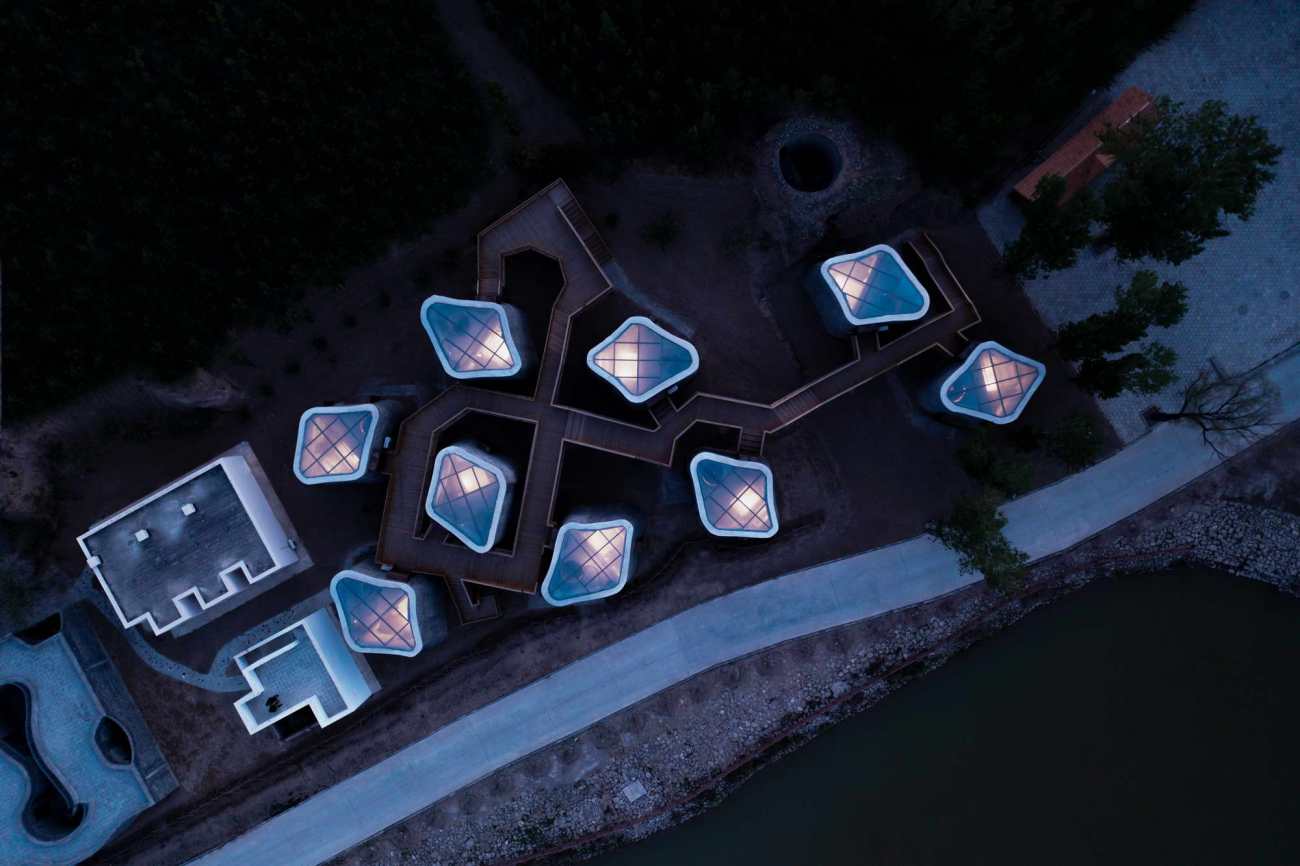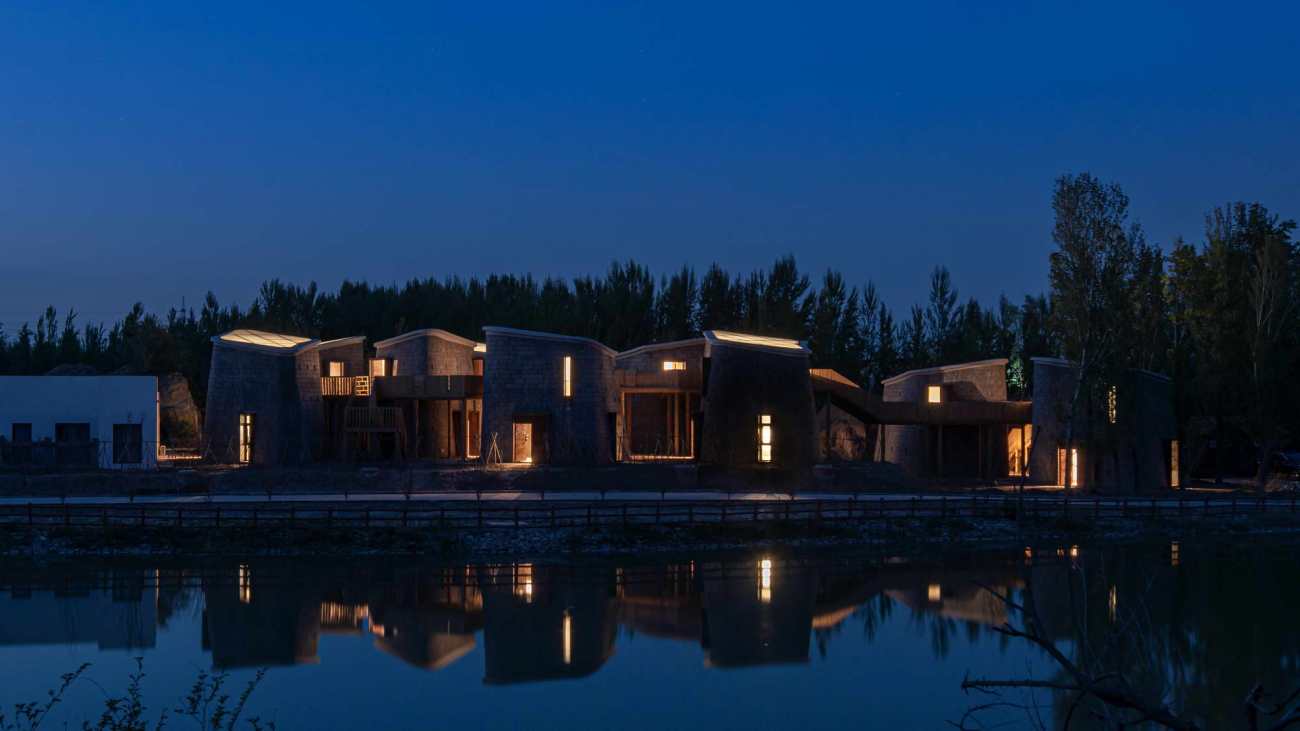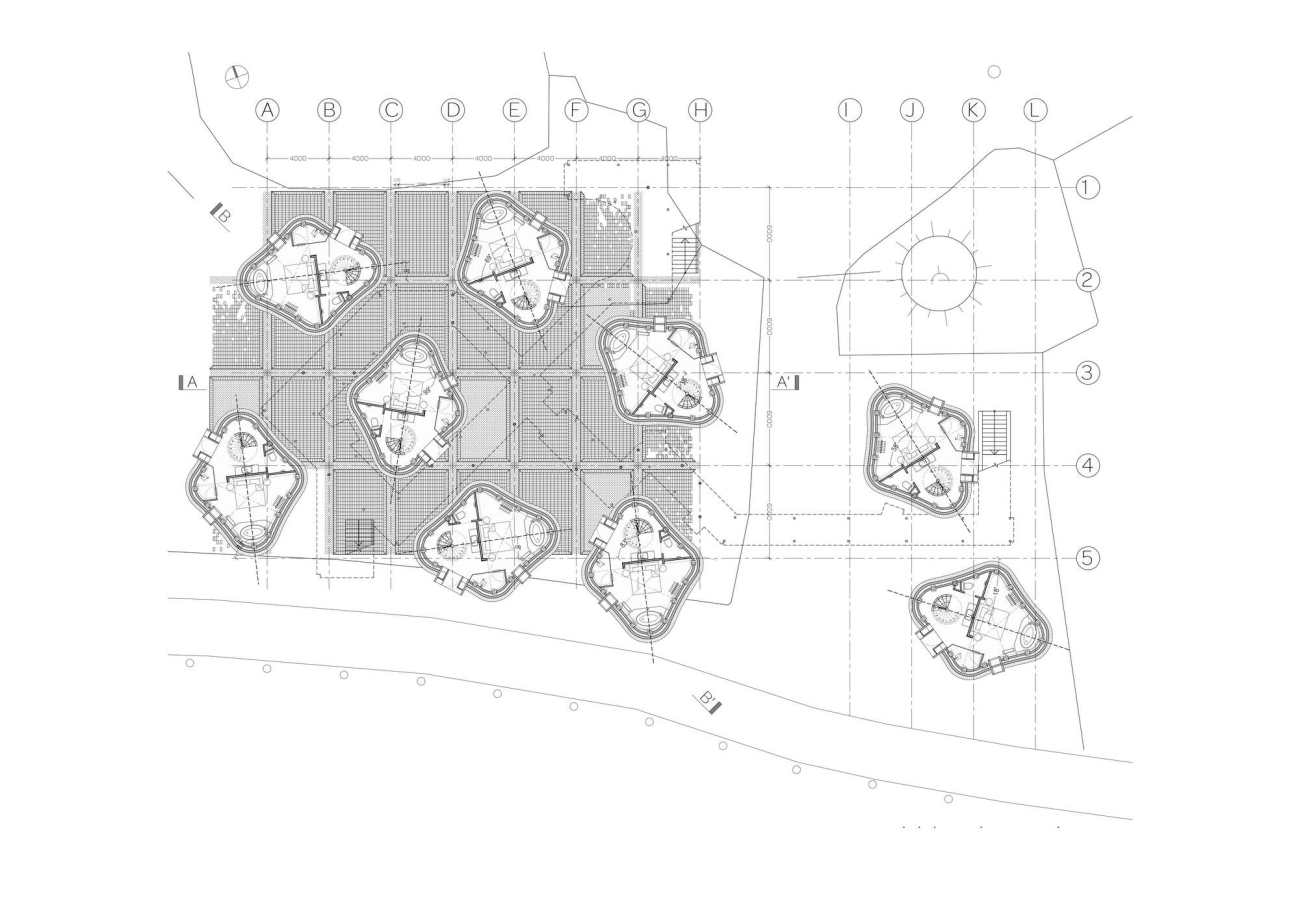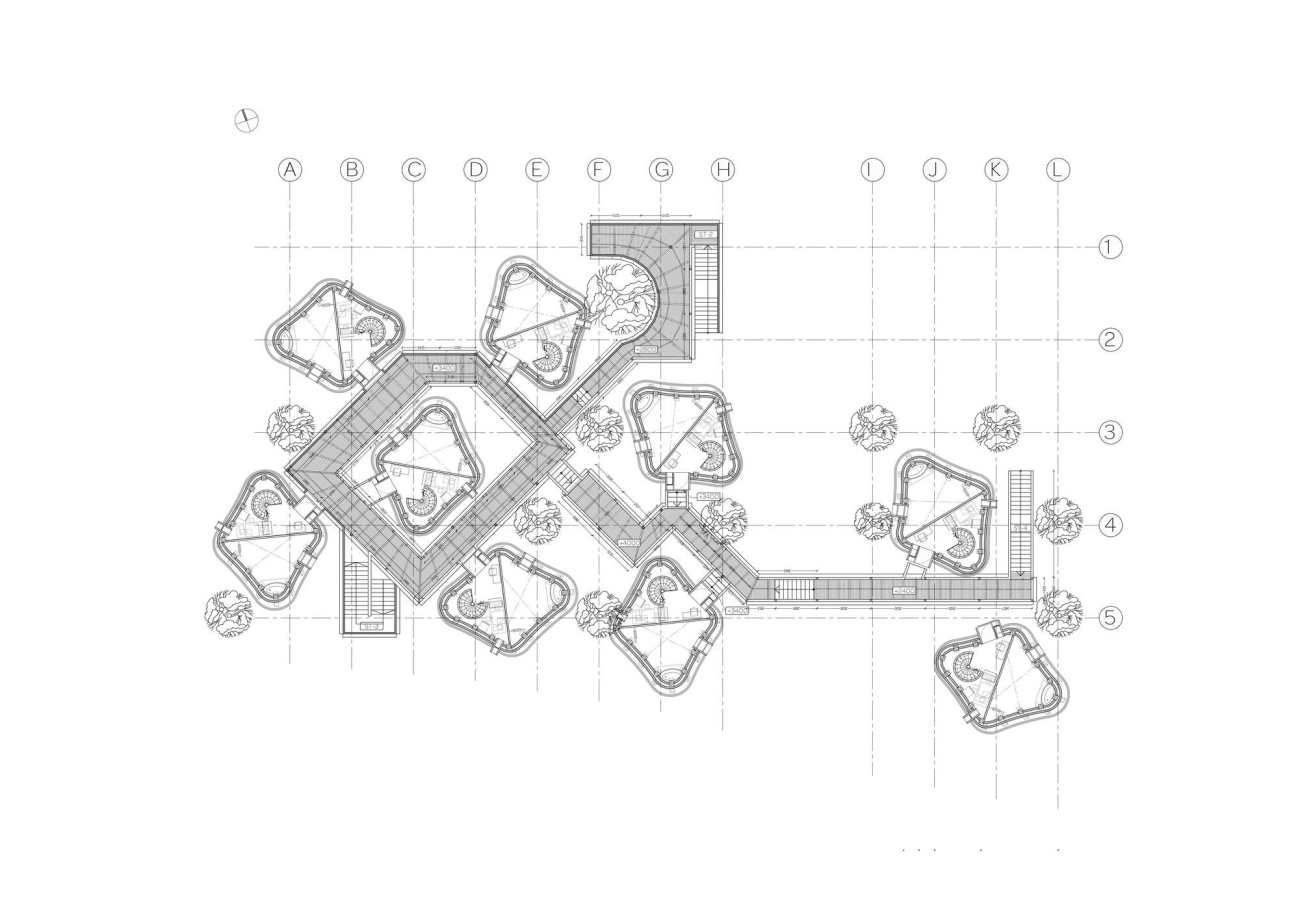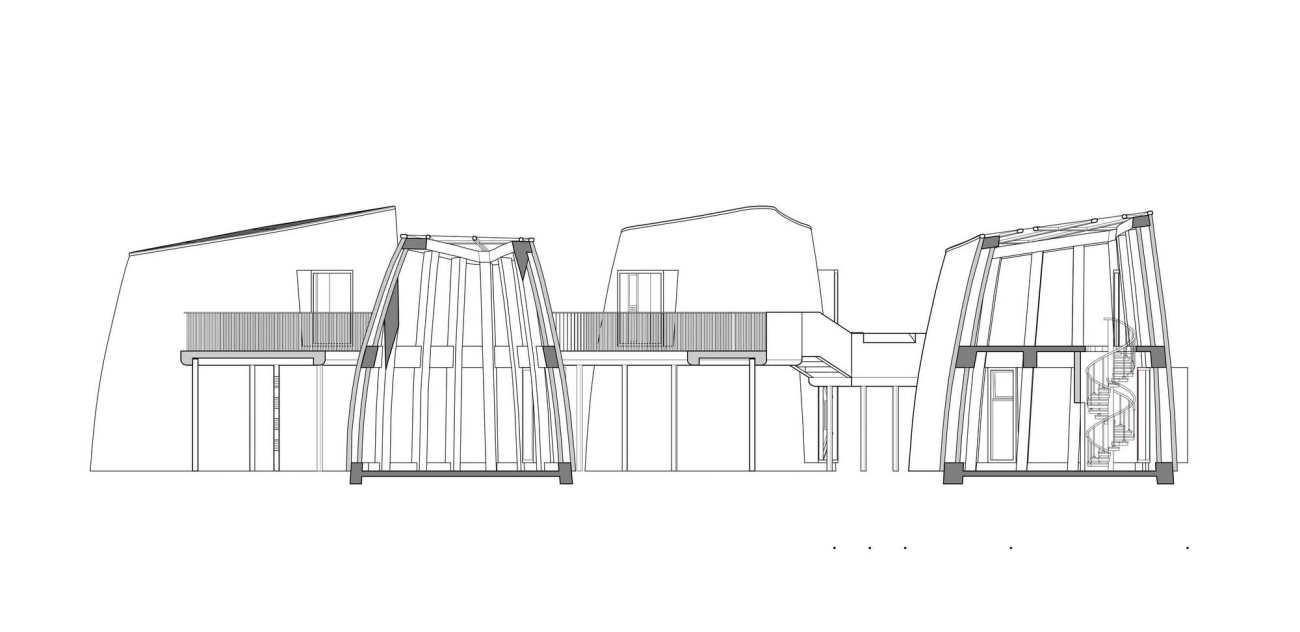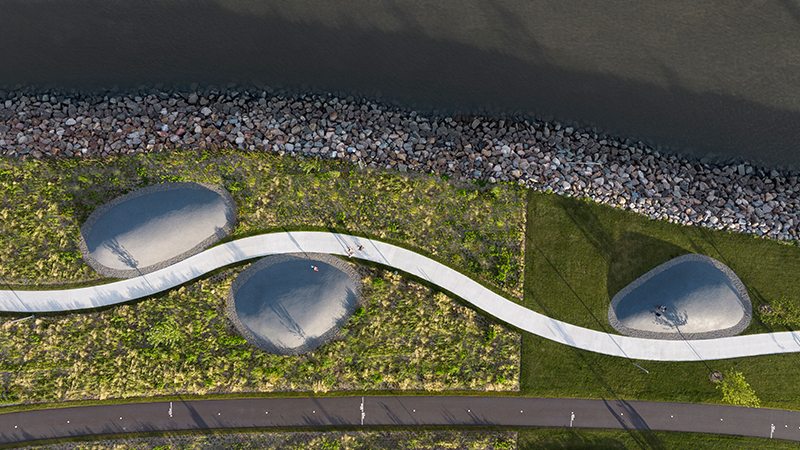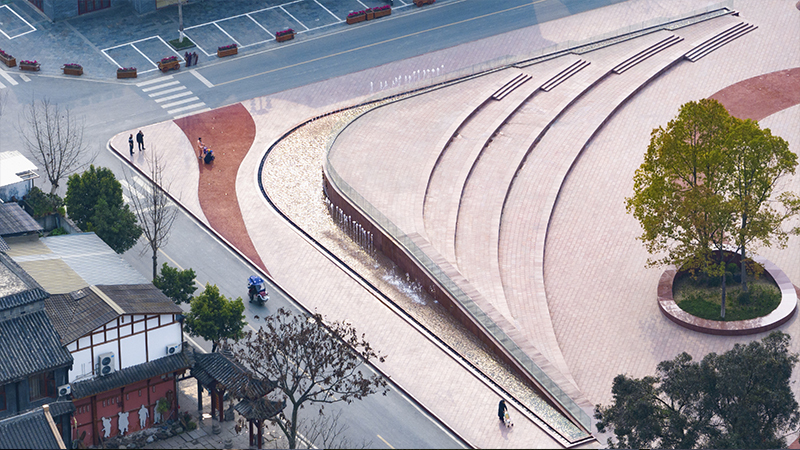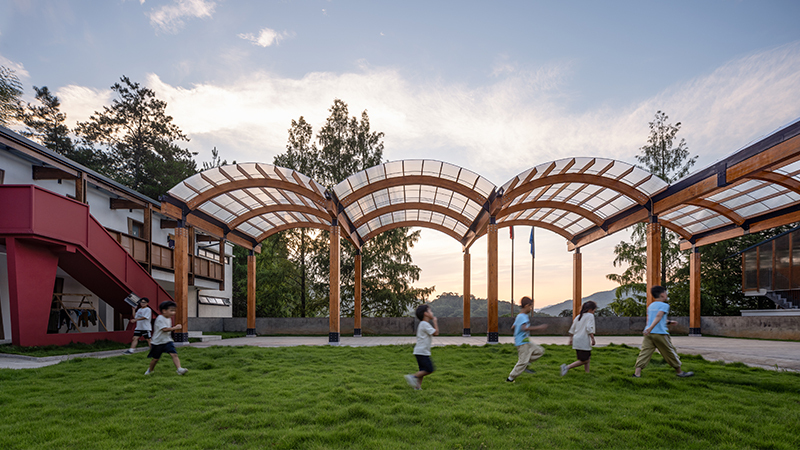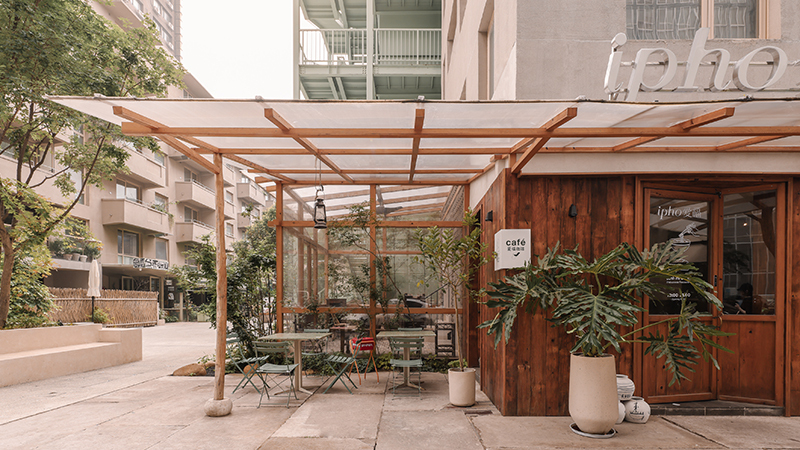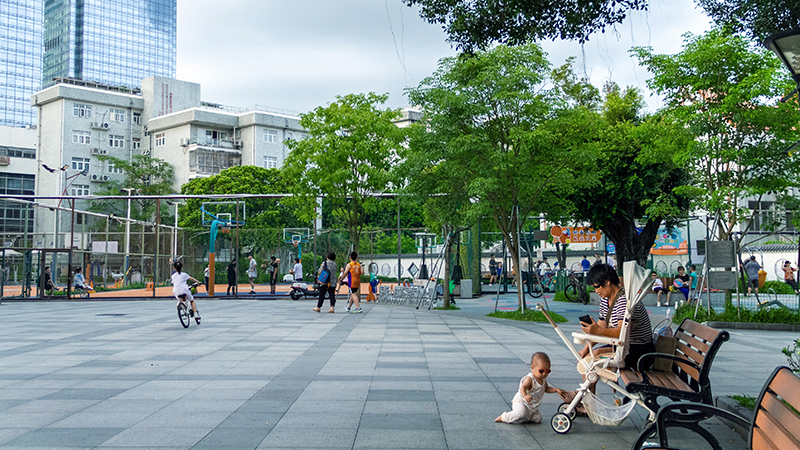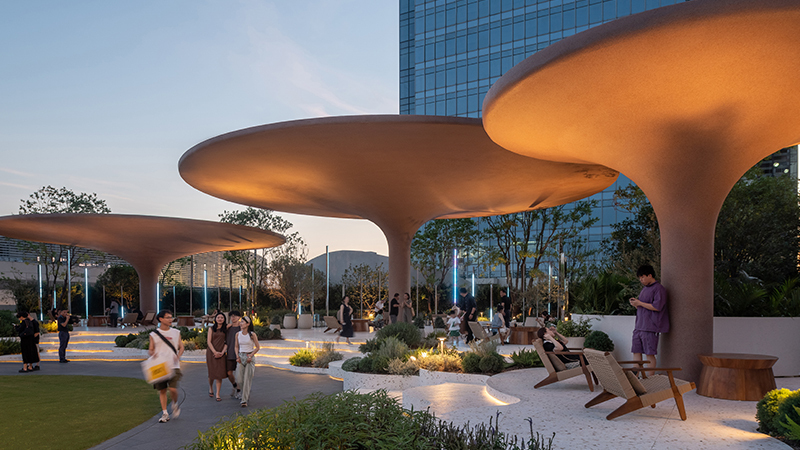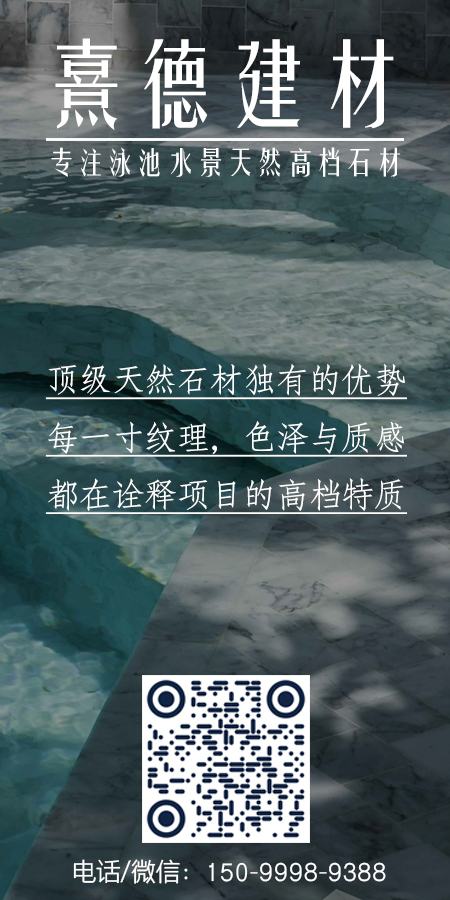“空心村” 是中国农村地区普遍存在的一个现象,整个村庄的原住民都搬迁到新农村住宅区去了,剩下他们破旧的宅基地。FA 设计师公社选了西窑头村为改建空心村的开首,该村有 16 块宅基地,改造后成为共享农庄,为农民提供宅基地的收益,解决当地部分贫困户的就业,振兴蔚县的剪纸,打树花等非遗的文化传承。河北张家口西窑头农村振兴项目始于FA青年建筑师奖竞赛, “西窑洞里” 是胜出的十二位设计师作品之一。
"Hollow villages" are a common phenomenon in China rural areas. Most of the aboriginal households of the village have moved to the new rural residential areas, leaving their dilapidated homesteads. Considering the cultural heritage in Yu County such as paper-cutting, wood crafting and ‘Fiery Trees and Silver Flowers’, the Fortune Art (FA) Homestay selected Xiyaotou Village, out of 100 villages in Yu County, as the beginning of village poverty alleviation. The village have been transformed into communal farms to provide local villagers with income via offering accommodation, local food services and activities. The rural revitalization project of Xiyaotou Village started with the 2018 FA Emerging Architect Award. "Grotto Retreat Xiyaotou" is one of the 12 winning designs.
“西窑洞里” 南侧是湖景及当地村部落,北侧是自然绿化景观。沿东西轴线,在这块扁长的地块上平行于边界布置。设计概念以农村与城市人际网络的本质差别作起点,以直立式 “窑洞” 融入木栈道的手法重新呈现场地原有的窑洞居所,通过把原始 (农村“熟人社会”) 的洞穴居住形式并置于现代(城市“陌人社会”) 的生活模式,从而希望实现一个公共与私密并存的社区群体。隐藏的四乘六米的轴线网格源于场地原有窑洞居所之长宽比尺寸,作为连廊结构布置的基调,精神意义上支撑着新建筑群。在新建“窑洞”的处理手法上,取道于分散的量体、双曲线有机形体、门窗框尺寸比例和当地的材料与建造方式,使建筑群可兼容于场地以及其他作品之间。
The design concept starts with the radical difference between the rural and urban interpersonal networks, the native cave dwellings of the site are re-interpreted as vertical "grottos”. By flowing the bridge of connectivity in between the private “grottos”, the design attempts to realize a community in which public and private coexist. The bridge is supported by a hidden four-by-six-meter grid, which is derived from the length-to-width ratio of the original cave dwellings on the site. It serves as the keynote for the layout of the corridor structure and supports the new building complex in a spiritual sense. Wandering under and above the wooden bridge, one could oversee surrounding landscape and aboriginal architecture of Yu County, which are framed by the hyperbolic facade, pine wood columns and corten-steel fenestration of the complex. For the treatment of the vertical "grottos” unit, with the implementation of scattered volumes, hyperbolic shapes, various fenestration dimensions, local materials and construction methods, the building complex attempts to be compatible with the site and amongst other works.
▼轴测图,连廊依照4×6米的轴线网格布置,axonometric, bridge supported by a four-by-six meter grid
村民与游人可自由穿行于“窑洞”之间或木栈道之上,并通过“窑洞”、窗洞、柱子、木桥等组成的边框,将村内外人造或自然景观框入其中。各“窑洞”里的天窗及七米层高让住户在进入建筑后可专注于空间的垂直性,“以天地为房屋,以房子为衣服” (刘伶)。大面积天窗让住客可体验农村“日出而作,日入而息”的作息以及提升对太阳轨迹的敏感度。冬季热能从天窗进入,并由双层砖墙保存;夏季热能可通过体量产生的烟囱效应由不同方向的窗户排出。
With assistance of the seven-meter-high ceiling, the sun roof of the vertical “grottos” encourages residents to focus on the verticality of the space, “housed by the sky and the earth, and clothed by the house” (Liu Ling). The introduction of generous skylights contextualises residents to rurality’s rhythm of “working from dawn to dusk” and further expose their sensitivity to the sun’s trajectory. Climatically, in order to warm the three quarters of Zhangjiakou averaging 10 Degree Celsius, sun rays enter through skylights and are preserved by double-layered brick walls; during summer, heat can be discharged via chimney effect given rise by the collaboration of the unit’s geometry and fenestration.during summer, heat can be discharged via chimney effect given rise by the collaboration of the unit’s geometry and fenestration.
建筑立面凸出的砖块是局部建筑过程之载体,曾为竹棚作临时结构支撑点以供砖匠完成平均高7米的双层砖墙。他们与连廊木结构的能见度取决于太阳强度及角度和云层密度,于建筑双曲面映出瞬息的时空关系。
The protruding bricks on the elevation, as the vehicle of a part of the construction process, were the position where the scaffolding found its temporary support for bricklayers to complete the double-layered brick wall with an average height of 7 meters. Their visibility on the facade depends on the intensity of the sun and cloud density. The shadow of the protrusions and wood bridge cast on the hyperboloid morphs with the sun’s trajectory, emerging ephemeral time-spaces.
考虑到建筑群日后的发展方向,聚落的体量分散手法可增加对未来不同功能的包容性, “窑洞”与“窑洞”之间和木栈道可供雕塑或其他装置艺术品作展览空间,亦使得乡村的空间体验能够于体量间得以延续。除了与农村建立起良好的物理关系之外,沿用合适的运营模式以及文化内容生产与再生是农村振兴项目可持续发展的动能,从而让建筑成为一个真正意义上的文化载体及引擎。
Considering the future development direction of the complex, the volume dispersal method of the settlement can increase the tolerance of different functions in the future. Between the "cave" and "cave" and the wooden walkway can be used for sculpture or other installation art exhibition space, and the rural spatial experience can be continued between the volumes. In addition to establishing a good physical relationship with the countryside, the appropriate operation mode and the production and regeneration of cultural content are the driving force for the sustainable development of the rural revitalization project, so that the building can become a true cultural carrier and engine.
▼地面层平面图,ground floor plan
▼二层平面图,first floor plan
▼剖面图,sections
项目信息
建筑设计:一间建筑 A( )VOID
办公网站:www.studioavoid.com
办公电邮:design@studioavoid.com
地址:西窑头村,张家口,河北,中国
项目年份:2021
建筑面积:820 ㎡
主持建筑师:韩橼
设计团队:马廷光,黄天佑,姚家文
合作设计院:北京腾远工程设计有限公司
项目总策划:易居联合创始人 朱旭东
指导单位:北京市密云区人民政府 / 张家口市人民政府 / 中国物业管理协会乡村振兴协作委员会
投资单位:蔚县人民政府/上海太德励拓互联网科技股份有限公司
策划开发:太德乐农(北京)互联网科技有限公司
施工营建:唐山市市政集团有限公司
内装工程:上海欧开建筑装饰工程有限公司
运营顾问:华侨城度假酒店管理(上海)有限公司
运营管理:蔚县良耜文化发展有限公司
摄影师:郭哲 | 微风建筑摄影
更新日期:2021-08-10 16:26:30
非常感谢 一间建筑 带来的精彩项目, 查阅更多Appreciations towards A( )VOID for sharing wonderful work on hhlloo. Click to see more works!
